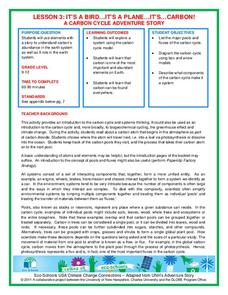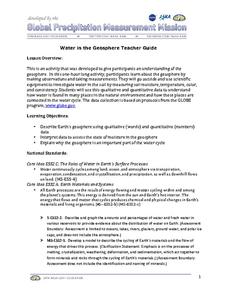Curated OER
The Water Cycle
Your class sets up a mini water cycle model to examine the process. Then they watch an animation, following a water molecule through the cycle. A well-developed lab sheet guides learners through the lesson and a PowerPoint presentation...
Baylor College
Fossil Fuels and the Carbon Cycle
Humans are quickly depleting Earth's fossil fuels and locating them is becoming increasingly difficult! Layered muffins are used for models as young geologists take core samples in order to determine the presence of oil. Consider first...
National Science Teacher Association
Middle School Sampler: Science
Focus on inquiry-based learning in your science class with a series of activities designed for middle schoolers. A helpful packet samples four different texts, which include activities about predator-prey relationships, Earth's axis and...
National Wildlife Federation
It's A Bird...It's A Plane...It's...CARBON!
An interesting lesson takes pupils on a trip through the carbon cycle. A reading passage allows scholars to take notes and make choices about what happens to the carbon on its journey. This third lesson in a series of 21 discusses...
Virginia Department of Education
The Hydrologic Cycle
There is the same amount of water on earth now as there was when it was formed. The water from your faucet could contain molecules that dinosaurs drank! Young scientists build their own hydrologic cycle model and observe it for five...
Virginia Department of Education
The Cycles of Nature
Encourage peer collaboration and assist with the creation of visual aids to identify carbon, water, and nitrogen cycles as your class learns more about nature. They discuss relative information, create a visual aid depicting the chosen...
Chicago Botanic Garden
The Carbon Cycle
There is 30 percent more carbon in the atmosphere today than there was 150 years ago. The first instructional activity in the four-part series teaches classes about the carbon cycle. Over two to three days, classes make a model of the...
Core Knowledge Foundation
Cycles in Nature Tell It Again!™ Read-Aloud Anthology
A read-aloud anthology offers stories all about nature's life cycles. Over three weeks, second graders listen to and discuss tales about the cycles of daytime, nighttime, seasons, plants, trees, frogs, butterflies, and water. Following...
Curated OER
Water Cycling in the Wilderness: Alaska quarter reverse
The Alaskan wilderness contains every imaginable element of the water cycle: it has flowing streams, cool spring rain, and frozen glaciers. Pupils use a series of worksheets to identify and define evaporation, condensation, and...
Curated OER
Butterfly Life Cycle
Focused little scientists will flitter their arms back and forth across the room with excitement as they learn the life cycle of a butterfly and how living things grow and change over time.
Curated OER
Cycles and Starting Mealworms
Here is a fascinating lesson about the life cycles of plants and animals, and other cycles found in nature. Learners explore the cycle of the moon, the tides, and other sequences of events in every day life. The big activity is the...
Captain Planet Foundation
Rotting Away
What happens at the end of a plant's life cycle? Show kids the natural way that plants show that they're decomposing, as well as the importance of compost, with a lesson about living organisms. After reading Log Cabin by Anne Schreiber,...
Columbus City Schools
Biome Basics with a Disastrous Twist
Bored with your current biome bag of tricks? This bundle is a bountiful bag of biome fun! Travel the globe with seventh graders and explore the biotic and abiotic factors that define our world's biomes. Then, introduce a little chaos to...
Curated OER
Water in the Geosphere
Through a PowerPoint presentation and the embedded animation and video, earth science enthusiasts find out about the moisture in the soil beneath our feet. In the animation, follow a water molecule on its path through the water cycle. As...
K-State Research and Extensions
Water
How are maps like fish? They both have scales. The chapter includes six different activities at three different levels. Scholars complete activities using natural resources, learn how to read a map, see how to make a compass rosette,...
National Wildlife Federation
Why All The Wiggling on the Way Up?
Some of the CO2 emitted by burning fossil fuels is removed from the atmosphere by natural sinks, such as the ocean. The fifth engaging lesson plan in the series of 21 examines the CO2 data from three very different locations. It then...
Alabama Learning Exchange
Nature's Life Cycle
Become a member of the Pollution Patrol and stand up to litter! After discussing the life cycle of seeds and discussing how plants figure into the food chain, young conservationists engage in several activities involving podcasts,...
Will Steger Foundation
The Carbon Cycle - What are its Implications for Climate Policy?
The carbon cycle isn't a bike which produces carbon and this lesson explains why. Through reading and discussion, groups of pupils create visual explanations of the four parts of the carbon dioxide oxygen cycle. Activities...
Curated OER
The Carbon Cycle
Here is an interesting science lesson. Pupils discover that carbon, just like water, is absolutely necessary for all living things to survive. They study how it cycles through nature, become familiar with the periodic table, and look at...
Berkshire Museum
Backyard Rocks
You don't have to travel far to learn about rocks, just step outside, pick up a stone, and begin investigating. After taking a class walk around the school grounds collecting rocks, young scientists practice their skills of observation...
NASA
Water Works on a Blue Planet
Keep within a water budget. Learners find out that less than 2.5% of Earth's water is available to drink—and that there is a fixed amount of water. Scholars read an interesting article comparing the available water to a game of Monopoly...
Core Knowledge Foundation
Rocks & Minerals
Take young geologists on an exploration of the rock cycle with this six-lesson earth science unit on rocks and minerals. Through a series of discussions, demonstrations, and hands-on investigations your class will learn about the...
Brooklyn Children’s Museum
Volcanoes!
Give young geologists an up close and personal look at volcanoes with a series of hands-on earth science lessons. Whether they are investigating the properties of igneous rocks, building their own volcanoes, or making fudge to model the...
Illinois Department of Natural Resources
Section Two: Why is Biodiversity Important?
Explore soil, genetic traits, natural resources, and pollution in a series of lessons that focus on biodiversity. Kids complete experiments to learn more about the importance of varied genes and organisms in an ecosystem.

























